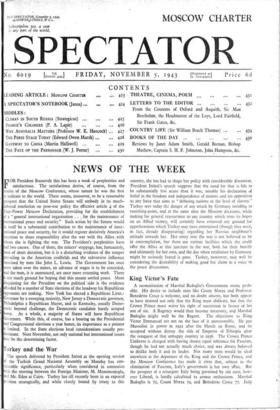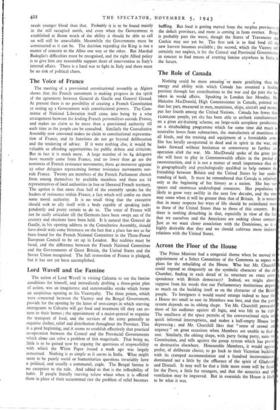King Victor's Fate
A reconstitution of Marshal Badoglio's Government seems prob- able. His desire to include men like Count Sforza and Professor Benedetto Croce is welcome, and no doubt sincere, but both appear to have insisted not only that the King must abdicate, but that the Crown Prince must waive his right of succession in favour of his son of six. A Regency would then become necessary, and Marshal Badoglio might well be the Regent. The objections to King Victor Emmanuel are not on the face of it unreasonable. He put Mussolini in power in 1922 after the March on Rome, and he accepted without demur the title of Emperor of Ethiopia after the conquest of that unhappy country in 1936. The Crown Prince Umberto is charged with having shown equal tolerance for Fascism, though he had not actually much choice, and was always believed to dislike both it and its leader. Not many tears would be shed anywhere at the departure of the King and the Crown Prince, and the Moscow Conference has made it clear that, subject to the elimination of Fascism, Italy's government is her own affair. But the prospect of a resurgent Italy being governed by old men, how- ever Liberal, is hardly calculated to arouse enthusiasm. Marshal Badoglio is 72, Count Sforza 7o, and Benedetto Croce 77. Italy
needs younger blood than that. Probably it is to be found mainly in the still occupied north, and even when the Government is established at Rome much of the ability it should be able to call on will still be unavailable. Meanwhile the Government must be constructed as it can be. The decision regarding the King is not a matter of concern to the Allies one way or the other. But Marshal Badoglio's difficulties must be recognised, and the right Allied policy is to give him any reasonable support short of intervention in Italy's internal affairs. There is a hard war to fight in Italy and there must be no risk of political chaos.



























